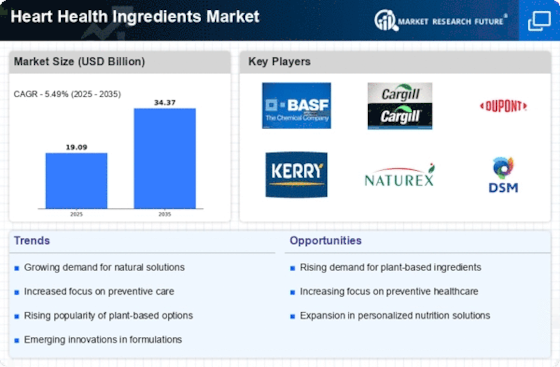Market Analysis
In-depth Analysis of Heart Health Ingredients Market Industry Landscape
Soy protein ingredients have become integral components across diverse industries, including food and beverages, animal feed, and pharmaceuticals and nutraceuticals. Widely recognized as a pivotal source of plant protein in the food sector, soy protein stands out for its exceptional nutritional value, versatility, cost-effectiveness, and reliability. With applications ranging from meat products to dairy alternatives, soy protein caters to the ever-evolving landscape of food and beverage innovation.
Within the food industry, soy protein ingredients play a multifaceted role, supplying all nine essential amino acids and delivering various functional benefits. Not only do they enhance moisture and flavor retention, but they also contribute to emulsification and texture improvement in an array of food products, including meats, frozen desserts, peanut butter, and cheese. The versatility of soy protein extends to the manufacturing of diverse food items, such as bars, bread, crispbread, breakfast cereals, dairy products, and beverages, reflecting its broad impact on the functional foods and supplement sectors.
The surge in demand for high-protein food products and dietary supplements has propelled the growth of soy protein ingredients. As consumers increasingly opt for plant-based proteins, soy protein has emerged as a key player in meeting this demand. Utilized in various forms, including flours, protein isolates, concentrates, and textured fibers, soy protein finds application in an extensive array of food items such as cheese, drinks, miso, tempeh, tofu, salami, and vegetarian meat substitutes. The reported beneficial effects on human nutrition and health, coupled with evolving consumer attitudes, have led to the growing integration of soy protein products into processed meat systems.
The sports nutrition segment has experienced consistent growth, driven by heightened awareness of health and the importance of adequate nutrition. Athletes and bodybuilders, in particular, have become avid consumers of sports nutrition products. The market for plant-based sports nutrition products, including those featuring soy protein ingredients, has gained traction as consumers increasingly prioritize plant proteins. A notable statistic indicates that plant protein ingredients constitute approximately 27% of the US sports nutrition market, underlining the significant role soy protein plays in this evolving landscape.
Moreover, soy protein ingredients have found increased application in animal feed, reflecting a broader shift towards natural and organic feed options to meet the rising demand for organic meat products. Leading manufacturers like CP Group, New Hope Group, and Cargill have introduced animal feed solutions based on plant protein ingredients. This development aligns with the growing preference for nutritious and easily digestible protein sources in animal nutrition, thereby contributing to the expanding market for soy protein ingredients.
In conclusion, soy protein ingredients have become indispensable components across various industries, offering nutritional benefits, functional versatility, and solutions to meet evolving consumer preferences. As the demand for plant-based proteins continues to rise, soy protein remains a key player, shaping the landscape of food innovation, sports nutrition, and animal feed. The multifaceted applications of soy protein underscore its pivotal role in fostering growth and innovation across diverse sectors.









Leave a Comment